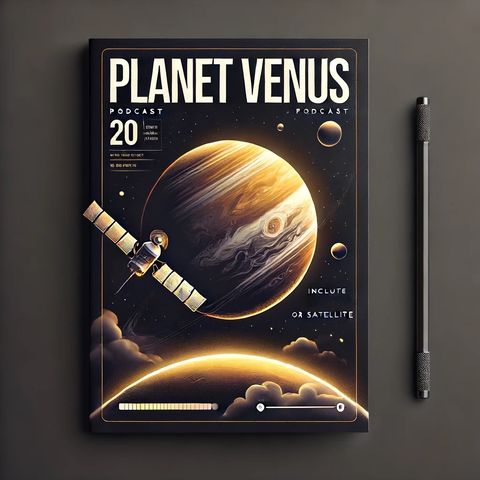Planet Venus - Earth's Twin?

Download and listen anywhere
Download your favorite episodes and enjoy them, wherever you are! Sign up or log in now to access offline listening.
Planet Venus - Earth's Twin?
This is an automatically generated transcript. Please note that complete accuracy is not guaranteed.
Description
Venus is often referred to as Earth’s twin because of its similar size and composition, but it has some stark differences that make it one of the most intriguing planets...
show more- Size: Venus has a diameter of about 12,104 kilometers (7,521 miles), making it nearly as large as Earth.
- Mass: It has a mass of 4.867 × 10^24 kilograms, about 82% of Earth's mass.
- Orbit and Rotation: Venus orbits the Sun at an average distance of about 108 million kilometers (67 million miles). It takes approximately 225 Earth days to complete one orbit. A day on Venus (one full rotation) lasts 243 Earth days, and it rotates in the opposite direction to most planets, including Earth, meaning the Sun rises in the west and sets in the east.
- Atmosphere: Venus has a thick atmosphere composed mainly of carbon dioxide (about 96.5%) and nitrogen (about 3.5%), with clouds of sulfuric acid. The dense atmosphere creates a runaway greenhouse effect, trapping heat and making Venus the hottest planet in the solar system, with surface temperatures averaging around 465°C (869°F).
- Surface: The surface of Venus is covered with volcanic plains, mountains, and vast lava flows. It has more volcanoes than any other planet in the solar system, with over 1,600 major volcanic features. The surface pressure on Venus is about 92 times that of Earth’s, equivalent to the pressure found 900 meters (3,000 feet) underwater on Earth.
- Volcanoes: Venus has numerous volcanoes, including Maxwell Montes, the highest mountain on Venus, standing about 11 kilometers (7 miles) high.
- Impact Craters: Despite its thick atmosphere, Venus has numerous impact craters, though fewer than other rocky planets, suggesting a relatively young surface reshaped by volcanic activity.
- Magnetic Field: Unlike Earth, Venus does not have a significant magnetic field. It has a weak induced magnetosphere created by the interaction of the solar wind with its ionosphere.
- Moons: Venus has no moons, a unique feature among the planets in the solar system.
- Space Missions:
- Mariner 2 was the first successful mission to fly by Venus in 1962, providing valuable data on its atmosphere and surface temperature.
- Venera Program: A series of Soviet missions between 1961 and 1984, with Venera 7 being the first spacecraft to successfully land on Venus and transmit data back to Earth in 1970.
- Magellan: A NASA mission that mapped the surface of Venus using radar from 1990 to 1994, revealing detailed images of its geological features.
- Akatsuki: A Japanese mission currently studying Venus's atmosphere and weather patterns.
- Retrograde Rotation: Venus's retrograde rotation (spinning in the opposite direction of most planets) is a unique characteristic that scientists are still trying to fully understand.
- Day Length: A day on Venus is longer than its year due to its slow rotation.
- Surface Conditions: The extreme temperatures and high pressures on Venus’s surface make it a challenging environment for exploration.
Information
| Author | QP-4 |
| Organization | William Corbin |
| Website | - |
| Tags |
Copyright 2024 - Spreaker Inc. an iHeartMedia Company
